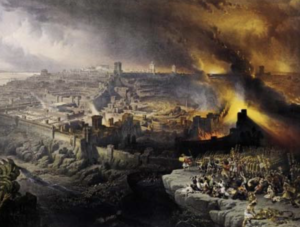

All we need to do is to welcome others… such a simple message but recall that the preceding verses speak of a message from Jesus – as shown on the right. When brother is going to grass on their brother, there’s trouble afoot. So, in such circumstances, what good is “do you want a cuppa?”
Perhaps it isn’t even in the cleanliness of the water, but in that someone has stopped and given something to someone else, without a contract, with no expectation of any response.
In Matthew 10:40-42 we have some words of hospitality. There is a form of hierarchy perhaps but one in that all are received the same. That’s counter cultural.
We welcome Jesus, who is welcomed by God. The one who welcomes the prophet, who welcomes the righteous will receive the reward of the righteous. Have we covered everyone yet? No.
Whomever gives even a cup of cold water to the little ones… (p.s. they are not referring to children here ‘mikros’, the Greek for ‘little ones’ often was believed to refer to those who are young in faith or particularly vulnerable – not necessarily children). Who might be the little ones in society? Perhaps the disregarded, the unheard, the ‘waste of space’ people, the ‘not us’ – no one who offers them that cuppa will lose their reward.
Who do we know are the little ones?

under command of Titus in AD 70.
By David Roberts
It can be hard when we hear of such tragic news, of killings: in war and also in terror, and wonder whether we would offer that cup of water out for them. Jesus has been speaking in the preceding verses of such a hard time for the followers. Recall that Matthew is writing after the Temple has been destroyed, the Romans are running amok. The Sadducees (priests) are long gone, leaving the Essenes in the desert – await John’s Gospel – and the Pharisees, the teachers of the Judaic law. Rabbi’s would soon emerge, seeking to harmonise the factions so that the faith might continue in such turbulent times. The followers might be wary of providing hospitality to anyone just calling by. Hence the counter cultural call.
“It tells us to treat a stranger the way we would treat someone who is a guest in our home—can I get you something to drink. It is a way of seeing the world—seeing all people.”
Russell Rathbun
Prophets
There is a lovely summary of 1 Kings 17:8-24
- Elijah asks the woman for some water, and she does it.
- Elijah asks for a piece of bread, and after some resistance due to the fact that she’s so poor she is going to starve to death, she does it.
- Elijah then stayed in the widow’s home for several days.
- The son became ill and died, but was raised by God through Elijah.
Is this what Jesus was alluding to when he spoke of a prophet? It all started with a cuppa.
But prophets also are counter cultural. They upset the status quo, the disturb the normality people crave. So, within our social media circles, do we welcome those whom we disagree with, to hear their perspective?
Or do we ban, block and unfriend those voices?
Cup of water
We might consider a cup of water a bit cheap: surely a hot cuppa would be preferable? I wonder whether clean water was the deciding factor, something I could actually drink. Do you want a cuppa?
Perhaps it isn’t even in the cleanliness of the water, but in that someone has stopped and given something to someone else, without a contract, with no expectation of any response. It is seeing Christ in the other, regardless of their background, looks. Could we do that?
I found the dialogue interesting and I enjoyed it